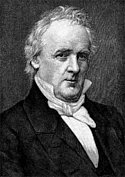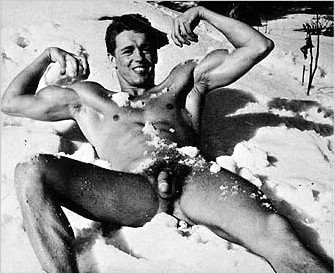Vintage Thursday Buchanan, James (1791-1868)
A Gay President ?
James Buchanan, the only "bachelor president" of the United States, had a long intimate relationship with William R. King, the only unmarried vice-president.
Early Life
Buchanan was the second of eleven children in a devout Presbyterian family of Scots-Irish origin. He was born on April 23, 1791 at the family farm near Mercersburg in southern central Pennsylvania.
He graduated from Dickinson College in the nearby town of Carlisle in 1809. After reading law for three years he was admitted to the bar. A fine orator with excellent legal knowledge, Buchanan quickly achieved great success as an attorney.
In 1819, he became engaged to Anne Coleman, the daughter of an extremely wealthy businessman from Lancaster, Pennsylvania. A few weeks later, however, Coleman broke the engagement, complaining that Buchanan "did not treat her with that affection she expected from the man she would marry." Coleman died suddenly shortly thereafter.
Political Career
Buchanan began his political career in 1814, when he became a member of the Pennsylvania House of Representatives. He moved on to the United States House of Representatives in 1821. After ten years of government service he considered returning to the private practice of law, but when President Andrew Jackson offered him the post of minister to Russia, he departed for St. Petersburg.
Buchanan returned to the United States in 1833 and was elected to the Senate from Pennsylvania. Soon after joining that body he met Senator William Rufus De Vane King of Alabama, who became his close companion for the next two decades.
Buchanan remained in the Senate until 1845, when President James Polk appointed him Secretary of State. At the close of the administration in 1849 he retired to Wheatland, his country estate near Lancaster.
Still a prominent and popular figure in the Democratic party, Buchanan received strong consideration for the presidential nomination in 1852. After forty ballots at the party convention, no winner had emerged from a field of candidates that also included Governor Lewis Cass of Michigan and Senator Stephen Douglas of Illinois. The convention eventually chose Franklin Pierce, a former senator from New Hampshire and brigadier general in the Mexican War, as its presidential nominee. To balance the ticket and to placate Buchanan and his forces, King was chosen as the vice-presidential candidate.
Buchanan campaigned vigorously for the ticket, and in a speech in October 1852 confidently predicted that Pierce and King would be elected "should their lives be spared"--a seemingly curious turn of phrase. Buchanan was well aware, however, that King was seriously ill with tuberculosis.
In hopes that a balmier climate might restore his health, King went to Cuba but continued to decline. Too frail to return to Washington for the inauguration in March 1853, he became the only vice-president sworn into office in a foreign country. Realizing that his condition was deteriorating rapidly, King sailed for Alabama, where he died on April 18, only a week after his return.
Pierce named Buchanan minister to Great Britain, where he spent most of the next three years. Shortly after his return to the United States, the Democratic party chose him as their candidate for president in 1856.
Buchanan's Presidency
Buchanan's administration (1857-1861) came at a time when the country was deeply divided over the issue of slavery. Buchanan attempted to effect compromises to appease both sides in order to avoid the secession of the Southern states.
However, with the election of Abraham Lincoln as President in 1860, Buchanan's attempts to prevent the secession of the Southern states proved unsuccessful.
At the conclusion of his term Buchanan retired to Wheatland, where he died on June 1, 1868.
Buchanan's Relationships
Of the two significant affectionate relationships in Buchanan's life, one--his brief affair with Anne Coleman--has been romanticized and the other--his two-decade long liaison with William Rufus De Vane King--all but obliterated.
The episode of Buchanan and Anne Coleman has been presented by some as a tragic love story: the handsome young lawyer woos and wins the beautiful heiress, but due to a misunderstanding she breaks the engagement, then suddenly dies before the lovers' quarrel can be made up, leaving the young man so devastated that he forswears marriage forever.
The romance appears in actuality to have been rather less than completely idyllic. Although Buchanan had become prosperous through his successful law practice, some in Coleman's circle suspected that he was more interested in her fortune than in the lady herself, and Coleman seems to have found him less attentive than she wished. In a letter of condolence to Coleman's father, however, Buchanan called his former fiancée "the only earthly object of my affections."
Buchanan may never have seriously considered marriage again, but he alluded to it--albeit in a jesting tone--in an 1844 letter to a friend, Mrs. James J. Roosevelt. Declaring himself "solitary and alone," Buchanan wrote, "I . . . should not be astonished to find myself married to some old maid who can nurse me when I am sick, provide good dinners for me when I am well, and not expect from me any very ardent or romantic affection."
The reason for his temporarily solitary state was the departure of his longtime companion William King (who was carrying the letter to Mrs. Roosevelt) to serve as minister to France. On the eve of embarking for Europe, King wrote of his feelings on being apart from Buchanan: "I am selfish enough to hope you will not be able to procure an associate who will cause you to feel no regret at our separation. For myself, I shall feel lonely in the midst of Paris, for there I shall have no Friend with whom I can commune as with my own thoughts."









No comments:
Post a Comment